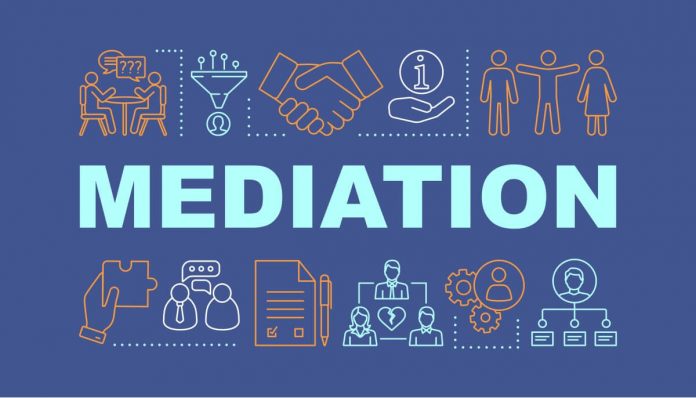This article is written by Monesh Mehndiratta, a law student at Graphic Era Hill University, Dehradun. The article explains the need and objective of the Mediation Bill, 2021. It further gives an overview of the Bill and lists out recommendations made by standing committees to eliminate the loopholes in the Bill.
it has been published by Rachit Garg.
Table of Contents
Introduction
What do you do if there is any dispute or if any of your rights have been infringed by someone?
The first thought that would strike your mind is to sue the person who is infringing your rights and move to court. There might be some people who would ignore the matter and avoid approaching the court out of fear that the procedure would be costly, hectic, and time-consuming. But how would you react if I say there are other means to resolve your disputes apart from courts?
Don’t be shocked. Such methods exist, and the parties try to resolve their disputes outside the courts. These are called Alternate Dispute Resolutions (ADR). These methods are usually cost-effective, easy, and less time-consuming. This is the reason most people nowadays prefer ADR. These methods consist of different ways to resolve a dispute, and unlike traditional courts, there is no judge involved; a third party is usually involved to help the two parties reach a mutual agreement or settlement. These are:
- Arbitration
- Mediation
- Conciliation
- Negotiation
- Lok Adalats
The field of ADR has not yet fully developed in the country and is still growing with time and technology. As and when people are informed about such methods and ways, they prefer above -mentioned methods in order to avoid the traditional court system with its long, hectic procedures and high costs. India has already taken a step towards the development and effectiveness of ADR by enacting the Arbitration and Conciliation Act, 1996. But there is a lot more work to be done in this regard. To strengthen the foundation and procedure of ADRs, the parliament introduced another Bill with respect to mediation, which is again a form of ADR, in the parliament in December, 2021. The Bill is named the Mediation Bill, 2021. The article gives an overview of this Bill and also mentions the issues highlighted by standing committees of the parliament along with their recommendations.
Meaning of mediation
Mediation is one of the forms of alternative dispute resolution wherein the two parties in a dispute are directed and assisted by a neutral third party who assists them to reach upon a mutual agreement or settlement. This neutral and impartial third party, who helps the two parties reach a settlement, is known as a mediator.
The two parties together consent to go for mediation and then seek the assistance of a mediator, who tries to settle the dispute by satisfying both parties with a settlement that is accepted and agreed upon by both parties. This is a non-binding procedure and is initiated only if both parties consent to it voluntarily. The procedure is cost-effective as the cost of the mediation process and the fee of the mediator are borne equally by both parties, and no party is overburdened. It is also less time-consuming and an easy process. Usually, high-tech businesses and companies adopt this method to resolve their disputes.
Principles of mediation
In the current scenario, mediation is usually adopted by big companies and upper-class people to settle their disputes. This is because they consider the traditional court system to be time-consuming. On the other hand, mediation does not involve intricacies like those present in the procedure followed by the courts. Unlike every other type of ADR, mediation has its own principles and rules according to which parties are bound to act and follow the proper procedure. The various principles upon which the method of mediation works are as follows:
Voluntary participation of parties
It is a kind of pre-condition for mediation. No proceeding for mediation can be initiated if the parties have not mutually consented to it, nor can it be done if one party forces the other party. There must be free consent from both parties, and it must not be obtained by fraud, force, coercion, or threat.
Mediation as a process to settle disputes involves the active participation of both parties. The parties to any dispute have to present their case and arguments in front of a mediator to seek a settlement that satisfies both of them. This can be achieved only if both parties consent voluntarily and participate actively in the mediation proceedings.
Confidential proceedings
Confidentiality is the most important principle of mediation. All the proceedings are kept secret and confidential, and no party along with the mediator is allowed to reveal them to any third person. A mediator has to ensure this confidentiality and is under a duty not to reveal the facts and information shared with him by the parties during the court proceedings or to anyone else.
Impartial mediators
A mediator in such proceedings is a third party who is not connected to either of the parties to the dispute. Such mediators must be impartial to ensure the ends of justice and that the principles of natural justice are complied with. If a mediator is impartial, then only it can ensure that there is no bias towards anyone, and as a result, there will be no unfair advantage to either of the parties in the settlement. Only an impartial mediator can ensure impartial proceedings and settlements.
Satisfaction of the parties
The ulterior objective of mediation is to settle a dispute between two parties by satisfying both of them. This can be done through an agreement of settlement that satisfies both parties and is not inclined towards either of them. Apart from this, it is the duty of the mediator to explain the importance and advantages of mediation to the parties so that such methods could be used frequently and help reduce the burden of the courts.
He can suggest a settlement and agreement to the parties and give them the best option to resolve their dispute, but he must not forget that parties are free to approach the courts if they are not satisfied or in case mediation fails to resolve their dispute.
Need for a Mediation Bill
Alternate dispute resolution in India consists of arbitration, mediation, conciliation, negotiation, and Lok Adalats. All these provide a mechanism where disputes are settled outside the conventional courts. In mediation, a mediator does not impose any agreement or settlement upon the parties but rather creates an environment where both of them can resolve their disputes and mutually reach a settlement. Currently, there is no uniform legal procedure for mediation, nor is there any such authority that controls the entire process. This work is done by private ADR centres.
In the absence of any legislation governing the procedure of mediation and any central authority, it can be presently initiated in two ways:
- If the court itself refers the parties to mediation according to the Code of Civil Procedure, 1908 under its Section 89 or,
- With the help of any contract between the parties that contains a clause for mediation or if it is mentioned in any specific statute.
Due to the lack of uniformity in the procedure and the absence of formal authority, ambiguities prevail and cannot be overcome. In such a situation, there is a need to enact proper legislation for mediation so that such ambiguities can be reduced. This will also relieve the courts of the burden of pending cases. The need and such suggestions have also been made by the Supreme Court in the case of M.R. Krishna Murthi v. New India Assurance Co. Ltd. (2019).
With this aim, a Bill on mediation was introduced in the parliament in 2020 and has now been referred to various standing committees for recommendations and suggestions.
Mediation Bill, 2021 : an overview
The Bill provides a detailed description of all the requirements of the proceedings of mediation and also explains mediated agreement settlements. It also gives the definition of terms like mediation. Mediator, institutional mediation, etc. This article further unfurls the objective and scheme of the Bill and gives its overview.
Objectives of the Bill
The following are various objectives of the Bill:
- It provides a uniform procedure to be followed for mediation in the country and also explains the meaning of specific legal terms.
- The ultimate objective of the Bill is to educate people about mediation, which is a less time-consuming and more cost-effective method to resolve disputes, in order to reduce the number of pending cases in court.
- The Bill also deals with pre-litigation mediation, which clarifies the position of such mediation.
- It further gives the power and functions of courts and tribunals in the mediation process.
- Mediation involves a neutral third party acting as a mediator. Currently, there is no authority to ensure that the principles of confidentiality, neutrality, impartiality, and participation of parties are achieved. But the Bill, if passed and enacted, will deal with such situations and clarify the position of mediation proceedings and their relevance.
Scheme of the Bill
The Bill is divided into 11 chapters, which consist of various sections and clauses, and 10 schedules. The different chapters under the Bill are:
- Chapter 1 deals with the title, extent, and commencement of the Bill as an Act if enacted by the government.
- Chapter 2 explains the application of the Bill.
- Chapter 3 explains the concept of mediation, pre-litigation mediation, mediation agreements, and the power of courts and tribunals to refer parties to mediation.
- Chapter 4 further talks about mediators, their appointment, termination, salaries, allowances, and replacement.
- Chapter 5 describes mediation proceedings and other intricacies involved therein.
- Chapter 6 further deals with the enforcement of mediated settlement agreements.
- Chapter 7 explains the concept of online mediation.
- Chapter 8 prescribes the establishment of the Mediation Council of India and its other necessities.
- Chapter 9 provides for mediation service providers and institutes.
- Chapter 10 explains community mediation.
- Chapter 11 is a miscellaneous chapter dealing with mediation funds, accounts, and audits.
Features of the Bill
The features of the Bill are:
- It gives the uniform definition and meaning of mediation, mediators, and other legal terms and explains the concept of pre-litigation mediation.
- It also promotes institutional mediation as a mechanism to resolve disputes.
- It further enlists the disputes that are not fit for mediation and are excluded under the Bill from such proceedings.
- It defines the role and functions of mediators and provides provisions for their appointment, termination, and replacement.
- It provides that all the agreements or settlements of mediation will be binding on the parties and have the same effect as if passed by the courts.
- It also gives the power to the courts and tribunals the power to refer a case to mediation and outlines the steps to be followed in such a process.
- The parties have been given a right under the Bill to withdraw from the mediation proceedings or request to change the mediator.
- It envisages the enforcement of mediated settlement agreements and their challenges.
- To fulfil the objective of digital India, it also provides provisions for online mediation.
- One of the most important features of the Bill is the establishment of the Mediation Council of India, which is a formal legal authority to deal with mediation and issues arising from its mechanisms.
- It prescribes the composition of the council, the incorporation of members, their retirement, and their termination, along with its powers and functions.
- It further explains the concept of community mediation and its procedures.
- It also deals with mediation funds, accounts, and necessary audits and provides provisions for mediation service providers.
Applicability of the Bill
Section 2 of the Bill explains the applicability of the Bill. It provides that the Bill will be applicable to all mediations in the country where:
- All the parties to a dispute are either residing in India, or incorporated here, or carry on business in India or
- Where the mediation agreement provides any such dispute will be resolved by mediation according to the provisions of the Bill or
- Where there is international mediation.
It further provides that it will not be applicable if one of the parties or both parties are central or state government, public bodies, corporations, or local bodies, entities owned and controlled by such government except in cases where the matter involves a commercial dispute between the parties.
Meaning of mediation under the Bill
Section 4 gives the meaning and definition of mediation. According to this Section, mediation is a process wherein the parties to a dispute request a third party called a mediator to help them and assist them in reaching a settlement mutually. It also includes online mediation, pre-litigated mediation, and community mediation.
Mediation agreement and pre-litigation agreement
According to Section 5 of the Bill, the following are considered mediation agreements:
- Agreement that is in writing and is given by the parties or by any of them that claims on behalf of both of them and further submits a dispute to mediation.
- Any mediation clause in a contract of a specific agreement will also be treated as a mediation agreement in case of a dispute.
- Agreement in writing if it is recorded as:
- Documents signed by the parties,
- A letter or communication between the parties in any electronic form,
- Pleadings in a suit.
- In the case of international mediation, any such agreement according to Section 3 clause (a) will be treated as a mediation agreement.
According to Section 6 of the Bill, pre-litigation mediation means that it is necessary for the parties to try to settle their disputes through mediation even if there is no mediation agreement before referring the matter to any civil or commercial court. For example: under clause 6 of Section 6, a dispute over the compensation in a case of an accident under the Motor Vehicles Act, 1988, can be referred to mediation before it is claimed in a tribunal, and if a settlement is reached, it is placed before the tribunal for consideration.
Mediators
Section 3(h) of the Bill defines the word ‘mediator’ as a person appointed to undertake mediation proceedings under the Bill and who is also registered as one with the council. Further, chapter IV deals with mediators, their appointments, terminations, and the preferences of the parties.
Appointment termination and replacement of mediators
Section 10 of the Bill gives the parties the power to decide on a mediator for their disputes and the process for its appointment. Such a person must be qualified to act as a mediator, as specified in the Bill. If the parties are not able to decide on a mediator or if the mediator decides, or refuses to act as a mediator in their case, they can apply to the mediation service provider, and then it will appoint a mediator from the panel for their dispute within 7 days. While doing so, the service providers are under an obligation to consider the preferences of the parties.
Section 13 further allows the termination of the mediator on the grounds of:
- Application of the parties,
- Conflict of interest or
- If he himself withdraws to be a mediator.
In such a situation, the service provider will again appoint a mediator from the panel within 7 days of such termination. (Section 14).
Role of mediator
The mediator has to perform the following functions:
- According to Section 12, a mediator has to disclose any circumstances that will affect the confidentiality of the proceedings or his impartiality or that may lead to a conflict of interest. The parties have been given a right to raise objections after such disclosure. It is the duty of the mediator to conduct mediation proceedings.
- He will assist them impartially to amicably reach a settlement (Section 17). Further, he will ensure objectivity and fairness in the proceedings and that the principles of voluntariness, confidentiality, and self-determination of the parties are maintained throughout.
- Further, he will determine the language to be used in the entire process of mediation and try to clarify all the misunderstandings between the parties and their doubts and issues.
- However, according to Section 19 of the Bill, he will not act as an arbitrator or representative counsel for the parties, nor will he act as a witness in any judicial proceedings.
Mediation proceedings
Such proceedings will be initiated from the date when the notice is served on the other party for mediation, in case there is a mediation agreement. If there is no such agreement, then it will be commenced from the date when a mediator is appointed or decided by both parties. Such proceedings involve meetings with the parties jointly or separately during the sessions.
Parties have a choice to withdraw from mediation after the first two sessions, and if a party fails to do so and it results in the failure of mediation, the court can impose costs on both of them. Section 21 gives the time limit within which all the mediation proceedings must be completed, i.e., within 180 days. The proceedings will be terminated in the following manner:
- When the mediated agreement settlement is signed and authenticated.
- A written declaration is given by the mediator stating that such proceedings are not justified after consulting the parties.
- After 7 days after the mediation session where the party failed to attend the first two sessions without informing the mediator.
- Both parties communicated in writing to the mediator about their choice to leave mediation.
Mediated settled agreements
According to Section 22 of the Bill, these are agreements that consist of settlements between the parties settling all or any of their disputes. The agreement will be in writing and must be signed by both parties as per the section. In the case of institutional mediation, it will be signed and authenticated by the mediator and submitted to the service provider along with a cover letter, after which a copy will be served to the concerned parties.
If there is no agreement or settlement, a mediator will submit the report of failure, but it will not contain reasons of failure to the mediation service provider in case of institutional mediation while in other cases it will be given to the parties. Such agreements also include agreements from online mediation signed by the parties with the help of an electronic signature and authenticated by the mediator.
Enforcement
Section 28 of the Bill provides that signed and authenticated mediated settled agreements are final and binding on the parties, and these will be enforced in the same manner as a decree passed by a court under the Code of Civil Procedure, 1908.
Challenge
Section 29 provides that such agreements may be challenged, except for those referred to in Lok Adalats by either party, by filing an application within 90 days in a court of competent jurisdiction. Any agreement can be challenged due to various reasons listed below:
- Fraud,
- Corruption,
- Impersonation
- Mediation was conducted in matters that were not fit for the process.
Mediation Council of India
The council is a body corporate with perpetual succession and a common seal to exercise powers and functions as specified in the Bill.
Establishment
Section 33 of the Bill provides for the establishment of the council and states that its head office will be in Delhi or any other place notified by the central government. The council can hold and acquire movable or immovable property, enter into contracts, and sue or be sued in its own name.
Composition of the council
According to Section 34, it will consist of the following members:
- A chairperson having adequate knowledge and experience in dealing with public affairs and ADR will be appointed by the central government,
- Full-time members,
- Ex-officio member who served the post of secretary to the government of India in the Department of Legal Affairs or Ministry of Justice,
- Chief executive officer and
- Part-time member.
The members will hold the post for 4 years and will be eligible for re-appointment. However, they will no longer be eligible to hold office after the age of 70 years.
Duties and functions
The council has to perform various duties as given in the Bill. These are:
- It can appoint expert committees to discharge its functions.
- The chief executive officer of the council will be responsible for the daily administration and implementation of decisions of the council.
- It is the duty of the council to promote domestic and international mediation in India by various means.
- Make India a robust centre for mediation.
- Make guidelines for the continuous education and assessment of mediators.
- Provide procedures for the registration of mediators, their withdrawal, and their suspension under different conditions.
- Make a professional and ethical code of conduct for the mediators.
- Hold training and workshops in different areas to educate people about mediation.
- It has to enter into memoranda of understanding with domestic and international bodies.
- Recognise mediation institutes and service providers.
- Publish the necessary information and data.
- Maintain an electronic record of the mediated and settled agreements.
Community mediation
As the name suggests, this mediation involves a matter that is affecting the community or society at large. Section 44 provides that if any matter is affecting the peace and harmony of a community or locality, it can be settled through this kind of mediation with the consent of the concerned parties. To initiate the proceedings, the parties have to write an application to the authority under the Legal Services Authorities Act, 1987, or to District Magistrate or Sub-divisional Magistrate, and then mediators will be appointed through the panel. The procedure of such mediation is given under Section 45 of the Bill.
Matters not fit for mediation
The first schedule of the Bill provides a list of matters that are not fit for mediation. These are:
- Dispute that is not submitted for mediation.
- Dispute that involves allegations of fraud, forgery, impersonation, coercion, etc.
- Disputes relating to minors and deities.
- Disputes over the prosecution of criminal offences.
- Matters prohibited by public policy.
- Disputes where the rights of third parties are infringed and they are not parties to mediation.
- Dispute relating to the levy of penalties.
- Land acquisition matters and compensation disputes.
- Proceedings under the Electricity Act, 2003.
- Any investigation under the Competition Act, 2002 etc.
Reports of standing committees of the parliament
The Bill is currently submitted to the standing committees of the parliament for any recommendations or suggestions. One panel of the committee has highlighted certain issues and made recommendations to deal with those issues in the Bill. These are discussed below:
Issues highlighted by the committees
After analysing the Bill, some issues have been highlighted by some standing committees. These are:
Mandatory pre-litigated mediation
The Bill makes it mandatory for the parties to go for pre-litigated mediation even if there is no mediation agreement before approaching the court or any tribunal. This will unnecessarily bind the parties to mediation, even if they are not willing to opt for this method. This also shows the coercive nature of the Bill, which will result in delays and pending mediation cases.
When the parties are not voluntarily ready to choose mediation as a method to resolve disputes, they must not be forced to do so. Another issue in this regard is that the Supreme Court is given power under clause 26 of the Bill to make rules for pre-litigation mediation, which means that the parties will have no choice.
Non-commercial disputes
Another major issue is that the Bill is applicable only to commercial disputes if any of the parties are the central or state government, public bodies, local bodies, etc. The question is why non-commercial disputes involving the government as one of the parties can’t be dealt with through mediation.
Qualifications of the members of the council
Though the Bill provides for the appointment of members of the council, there is ambiguity with respect to their qualifications and experience. There are no specific qualifications for the members in the Bill.
International mediation
Another major issue is that an international mediation will only be considered if it is conducted in India. But there is no provision in the Bill for the settlements and agreements of the international mediation conducted outside. Whether such agreements will be enforced or challenged is not addressed in the Bill.
Recommendations and suggestions made by the committees
The following are recommendations made by the committees so far:
- Pre-litigation mediation must be made optional and voluntary. The right must vest with the parties to decide which process they want to choose for resolving their disputes and seeking justice.
- Another recommendation is that the appointment of the members of the council is done by a separate selection committee to ensure fairness and transparency. The provision in the Bill only provides that such members must have the knowledge and capacity, which is ambiguous. Some specific qualifications must be made for the selection of the members.
- The Bill only provides for a central mediation council. India being a diverse country, there must be state councils as well. This will help to achieve transparency and accountability, and all the state councils will be under the supervision of the central council, which will also help in achieving the objective of the Bill.
- The committees also suggested that all the mediators be registered under one authority, which can be the Mediation Council of India, and be given a unique registration number, which helps to hold training sessions easily.
- It also recommended reducing the time limit of mediation from 180 days to 90 days and the extension period to 60 days for speedy disposal.
Conclusion
Mediation is a process by which the two parties to a dispute request a third party who acts as a mediator to assist them in settling their dispute and reaching a settlement mutually. It is a kind of alternative dispute resolution that is different from the conventional court system. In this process, there is no need to go to court or have a special courtroom; instead, it is a fast, easy, and cost-effective mechanism to resolve disputes. However, there is no uniform legislation that deals with mediation in the country. In order to fill this gap, the parliament introduced a Bill in this regard in 2021. It is currently given for recommendations to the standing committees. If passed, it will help reduce the burden on courts due to the pendency of cases.
Frequently Asked Questions (FAQs)
What do you mean by online mediation?
According to Section 32 of the Bill, this kind of mediation can be conducted at any stage through electronic means over a computer network, but the only condition is that the confidentiality of the proceedings be maintained throughout the mediation.
What is the mediation fund mentioned in the Bill?
The Bill provides for a mediation fund for the promotion, facilitation, and execution of mediation proceedings under Section 46. This fund will be administered by the council and will contain the following amounts:
- Amount given by the government,
- Donations, grants, and contributions,
- Fees and charges received by mediation service providers and institutes,
- Amounts deposited by contributors,
- Amount from any other source,
- Any interest or investment.
What are the functions of mediation service providers?
According to Section 42, the service providers will perform the following functions:
- Maintain a panel of mediators.
- Select a mediator from the panel to conduct mediation proceedings.
- Provide sufficient infrastructure for the smooth conduct of all the sessions and proceedings.
- Encourage the mediators to follow a professional and ethical code of conduct.
- Registration of settlement agreements.
References
- https://prsindia.org/Billtrack/the-mediation-Bill-2021#_edn9
- https://www.thehindu.com/news/national/explained-the-mediation-Bill-2021/article65967986.ece
- http://164.100.47.4/BillsTexts/RSBillTexts/asintroduced/Mediation-RS%20int-20%2012%2021-E.pdf
- https://www.drishtiias.com/daily-updates/daily-news-analysis/parliamentary-standing-committee-report-on-mediation-Bill-2021
- https://hsfnotes.com/adr/mediation/#:~:text=Mediation%20is%20the%20facilitation%20of,has%20no%20decision%2Dmaking%20power.
- https://blog.ipleaders.in/mediation-meaning/#_ftn5
- https://www.legalserviceindia.com/legal/article-2762-mediation-in-india.html
Students of Lawsikho courses regularly produce writing assignments and work on practical exercises as a part of their coursework and develop themselves in real-life practical skills.
LawSikho has created a telegram group for exchanging legal knowledge, referrals, and various opportunities. You can click on this link and join:
Follow us on Instagram and subscribe to our YouTube channel for more amazing legal content.
 Serato DJ Crack 2025Serato DJ PRO Crack
Serato DJ Crack 2025Serato DJ PRO Crack












 Allow notifications
Allow notifications


